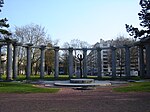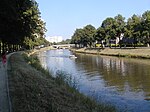Kuipke
Belgian sports venue stubsBuildings and structures in GhentSport in GhentSports venues in East FlandersVelodromes in Belgium

Kuipke or Citadel Park Velodrome is an indoor velodrome in Ghent, Belgium. It opened in 1927 and was rebuilt after a fire in 1965. It is best known from the Six Days of Ghent, held annually in November. The velodrome is also used as an event hall for concerts and occasional basketball games. On 21 March 1959 Louis Armstrong performed in the Kuipke, and in 2014, it was the location for the live shows of the Flemish version of The Voice.
Excerpt from the Wikipedia article Kuipke (License: CC BY-SA 3.0, Authors, Images).Kuipke
Sint-Kristoffelstraat, Ghent
Geographical coordinates (GPS) Address Nearby Places Show on map
Geographical coordinates (GPS)
| Latitude | Longitude |
|---|---|
| N 51.05 ° | E 3.7333333333333 ° |
Address
Sint-Kristoffelstraat 18
9000 Ghent (Ghent)
East Flanders, Belgium
Open on Google Maps









